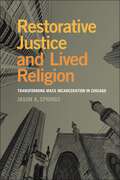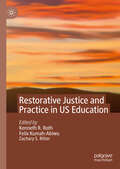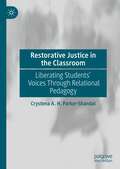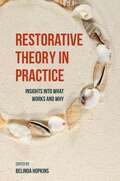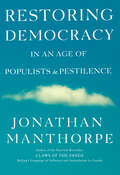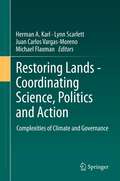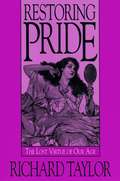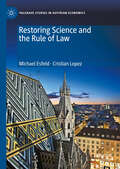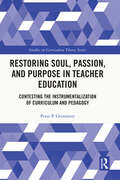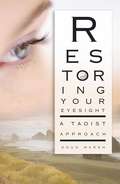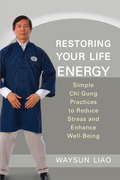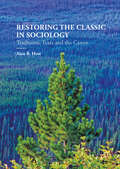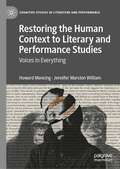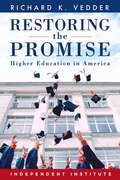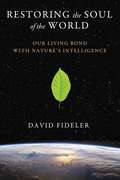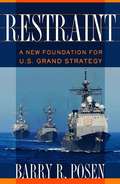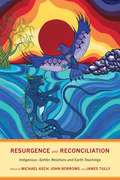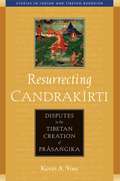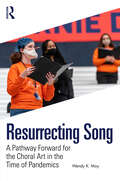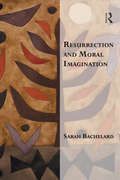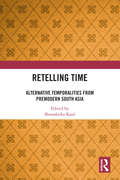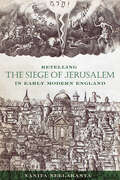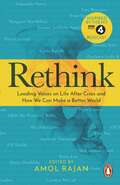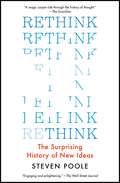- Table View
- List View
Restorative Justice and Lived Religion: Transforming Mass Incarceration in Chicago (Religion and Social Transformation)
by Jason A. SpringsFrames restorative justice as a form of moral and spiritual practice with the capacity to transform injusticeIn the United States “restorative justice” typically refers to small-scale measures that divert alleged wrongdoers from a standard path through the criminal justice system by funneling them into alternative justice programs. These aim not to punish the offender, but to constructively address the harm that wrongdoing may have caused to individuals or to the community, engaging with the wrongdoer to come to a response that might heal and repair the harm.Yet restorative justice initiatives generally fail to challenge and transform the racist system of mass incarceration. This book argues that these initiatives have the potential to do so, but that we need to better understand what restorative justice is, and how it should be implemented. It claims that restorative justice can achieve its desired effect only insofar as it provides a mode of association between people that is, at its core, moral and spiritual. The book explores the ways in which restorative justice ethics and practices exhibit moral and spiritual dynamics, and what difference such “lived religious” dynamics can make for purposes of transforming structural violence.Looking to Chicago’s restorative justice network as a model for developing these transformational and sustainable social changes, the volume showcases real-life examples of the kinds of practices and initiatives needed to shift the entrenched dynamics that fuel the prison-industrial complex across the United States.
Restorative Justice and Practice in US Education
by Zachary S. Ritter Kenneth R. Roth Felix Kumah-AbiwuThis edited volume offers a comprehensive overview of the dual concepts of Restorative Justice as a legal remedy and Restorative Practice as a philosophy to reduce harm and build resilient and just communities within social, cultural, and educational institutions. With contributions from leading practitioners and scholars, the book serves as a valuable resource for institutions seeking to center equity and reduce harm in multicultural learning spaces. Chapters combine insights into the origins and intent of Restorative Justice and Practice, showcase some of their early applications in higher education settings and beyond, and highlight their potential for promoting peace and building community on campuses across the country.
Restorative Justice in the Classroom: Liberating Students’ Voices Through Relational Pedagogy
by Crystena A. Parker-ShandalThis book focuses on how teachers can transmit and practice values through classroom circles that attend to and empower all students’ voices. A growing number of teachers are using relational pedagogy, drawing on Indigenous circle practice, as a pedagogical tool. Done well, circles can build and sustain dialogue and peaceful relations. Done poorly, circles reflect and reinforce relations of power, which, if disregarded, can be damaging for participants whose voices are silenced or not sufficiently heard. Parker-Shandal’s consideration of teachers’ professional learning and training in restorative justice in education focuses on ethnographic, classroom-based research in diverse urban elementary schools. Her data include observations of classrooms, teacher surveys, and interviews with students, teachers, and principals. The book provides a detailed account of the lived experience of students and teachers as they engage with and experience the transformative power of constructive dialogue about conflicts embedded in curriculum subject matter through restorative justice pedagogies.
Restorative Theory in Practice: Insights Into What Works and Why
by Pam Denicolo Dorothy Vaandering Margaret Thorsborne Mark Vander Vennan Mo Felton Shona Cameron Belinda Hopkins Wendy Drewery Ann Shearer Juliet Starbuck Pete WallisRestorative practice is an innovative approach to thinking about, and addressing, conflict and bullying, as well as disruptive, challenging and criminal behaviour. The approach is increasingly used to transform the culture of organisations, institutions and services and the way people communicate with one another. In this book, ten practitioners describe a restorative encounter as seen through the lens of their own theoretical model. The book's unique structure is modelled on a restorative practice known as Circle Time- comprising of a Check-in, a Main Activity, and a Check-out. In the Check-in the practitioner explains how their own theoretical model informs their practice; in the Main Activity they comment on the same case studies to highlight how each theory can deepen our understanding of what might be happening and why; and in the Check-out they reflect on what they have learned from reading each other's contributions. This is a unique exemplar of how restorative theory and practice can influence how practitioners think, learn and write about restorative practice. This will be an invaluable resource for restorative practitioners working across sectors including education, social services, youth offending or policy.
Restoring Democracy in an Age of Populists and Pestilence
by Jonathan Manthorpe“This global affairs veteran has carved out a solid, mature path, including for ‘flawed democracies’ like the U.S. We’d all be wise to follow.” — Vancouver SunFrom the author of the Claws of the Panda, a Globe and Mail bestseller, Restoring Democracy is quite literally a book for our times. Manthorpe argues that democracy is more resilient than it appears, and is capable of overcoming the attacks from within and without that have sapped its vigour since the end of the Cold War. He begins with a description of the events of 1989, one of the seminal years in modern history. This saw the end of the Cold War, and the apparent conclusive victory of democracy and its civic values. But the view of these changes as a triumph of democracy — as summed up in Francis Fukuyama’s essay "The End of History" — was short-lived. Russia, shorn of its Soviet empire, and the Chinese Communist Party, re-examining its survival after the Tiananmen Square Massacre, began devising ways to counter-attack the West’s triumphalism and these met with considerable success. Internal pressures and contradictions — wealth disparity being chief among them — threaten the survival of many democratic systems. Abandoned industrial workers turn to the repeated platitudes designed to appeal to those left behind without actually offering them the ways and means to catch up. Immigrants, refugees, and the reformist fixations of isolated liberal elites have provided ammunition for would-be despots. Adding to the pressures building on the political norms of our democracies, the COVID-19 pandemic has brought economic and social stand-still for which no country is prepared.
Restoring Lands - Coordinating Science, Politics and Action
by Herman Karl Juan Carlos Vargas-Moreno Lynn Scarlett Michael FlaxmanEnvironmental issues, vast and varied in their details, unfold at the confluence of people and place. They present complexities in their biophysical details, their scope and scale, and the dynamic character of human action and natural systems. Addressing environmental issues often invokes tensions among battling interests and competing priorities. Air and water pollution, the effects of climate change, ecosystem transformations--these and other environmental issues involve scientific, social, economic, and institutional challenges. This book analyzes why tackling many of these problems is so difficult and why sustainability involves more than adoption of greener, cleaner technologies. Sustainability, as discussed in this book, involves knowledge flows and collaborative decision processes that integrate scientific and technological methods and tools, political and governance structures and regimes, and social and community values. The authors synthesize a holistic and adaptive approach to rethinking the framework for restoring healthy ecosystems that are the foundation for thriving communities and dynamic economies. This approach is that of collective action. Through their research and practical experiences, the authors have learned that much wisdom resides among diverse people in diverse communities. New collaborative decision-making institutions must reflect that diversity and tap into its wisdom while also strengthening linkages among scientists and decision makers. From the pre-publication reviews: "Finally, we have a book that explains how science is irrelevant without people. It's people who decide when and how to use science, not scientists. This book gives us a roadmap for how to really solve complex problems. It involves hard work, and creating new relationships between scientists and the public that don't typically exist in our society." -John M. Hagan, Ph.D. President, Manomet Center for Conservation Sciences
Restoring Pride: The Lost Virtue Of Our Age
by Richard TaylorThe ideas put forth in Restoring Pride will seem, to many readers, elitist. That's because they are. Richard Taylor rejects the popular notion that all people are equal, embracing instead the idea that some people are simply better than others as human beings. Their superiority has nothing to do with class, power, or wealth; they are better because they are gifted and have made the most of their gifts. Taylor doesn't try to be politically correct and makes no apologies; he explains what it means to be more than normal and encourages people to fulfill their potential. <P><P> Pride, according to Taylor, is the justified love of oneself for having achieved personal excellence. People who use their natural gifts for significant and lasting achievements have the right to be proud of themselves. Furthermore, virtually everyone is in some way gifted. Some people hone their talents and better themselves while others follow paths that are easy, pleasant, common. People who fail to nourish and perfect their talents, who do only what is expected of them, are wasting their lives. We all have gifts and we need to identify them and excel in the areas in which we're gifted. Put another way, figure out what you're good at . . . and do it. <P><P> Superior people, people who are justifiably proud, are not concerned with what others think of them, but with how they measure up in their own eyes. They are their own most demanding judges. Although proud people set their own standards higher, and make their own rules stricter than those others might subject them to, there is a rule of conduct that must guide their relations with other people: be considerate. If they adhere to this maxim when dealing with friends or strangers, with great and powerful people or people unknown, they will need no other rule of right and wrong. Taylor's definition of pride leaves no room for conceit. Arrogance and self-centered behavior, he believes, have no place in the lives of the proud.
Restoring Science and the Rule of Law (Palgrave Studies in Austrian Economics)
by Michael Esfeld Cristian LopezScience and the rule of law are the two pillars of modernity. Even though both result from the attempt to employ reason to limit the exercise of power in the scientific and the political sphere, they bear in themselves the germs of their own destruction: scientism and welfare totalitarianism. This book examines a trend towards a new, specifically postmodern totalitarianism, namely a regime of “actually existing postmodernism” that is based on the collusion of four elements: (i) scientism and its political use, (ii) intellectual postmodernism, (iii) welfare states, and (iv) crony capitalism. The book then shows a way out by utilising the philosophy of Descartes and Kant, the social-normative turn in the 20th century, and the resources of Austrian libertarianism from Hayek and Popper to Mises, Rothbard and Hoppe. These intellectual resources lay the ground for a New Enlightenment and an open society shaped by a free science and voluntary cooperation under the rule of law. Restoring Science and the Rule of Law is essential reading for philosophers of science and for political theorists interested in the foundations of the rule of law.
Restoring Soul, Passion, and Purpose in Teacher Education: Contesting the Instrumentalization of Curriculum and Pedagogy (Studies in Curriculum Theory Series)
by Peter P. GrimmettThis text both challenges and traces the development of a culture of regulation, standardization, performativity, and governmentality evident in Anglophone teaching practice and education. Framed by a brief history of teacher education research and policy in North America over the last six decades, the text argues that the instrumentalization of curriculum and pedagogy has robbed teachers of their pedagogical soul, passion, and purpose. Using a conceptual model, Grimmett forges a pathway for teachers to adopt a soulful way forward in professional practice, individually and collectively enhancing autonomy over programs, and protecting the public trust placed in them as educators. This text will benefit researchers, academics, and educators with an interest in teachers and teacher education, educational policy and politics, and curriculum thinking and enactment more broadly. Those specifically interested in pedagogy, educational change and reform, and the philosophy of education will also benefit from this book.
Restoring Your Eyesight: A Taoist Approach
by Doug Marsh Thomas R. QuackenbushA holistic guide to improving one’s vision both physically and spiritually • Explains how blurred vision is a reflection of other imbalances in the body, mind, and spirit • Offers natural methods for improvement of poor eyesight and stress-related difficulties, including dyslexia and ADHD • Combines the core values of the Bates method of natural vision improvement and Taoism Fewer than three percent of children in North America are born with visual defects, yet as they become adults nearly two thirds will become reliant on prescription lenses to see clearly. Virtually nonexistent in pre-industrialized cultures, this epidemic of blurred vision can be traced to mental, physical, and spiritual imbalances in modern society. The traditional “quick fixes” of eyeglasses and contact lenses only serve to cover the true cause of blurred vision while increasing eye-strain, and often progressively worsen eyesight as the eyes become trained to work within the confines of the corrective lenses. The advent of refractive surgery carries even more serious risks. In Restoring Your Eyesight, Doug Marsh offers a natural alternative that shows readers how to improve their eyesight by taking conscious control of their vision health. He combines proven methods pioneered a century ago by eye doctor William Bates with the ancient Chinese wisdom of Taoism. Marsh describes how vision goes deeper than the eyes and optic nerves, extending well into the layers of the mind, emotions, and spirit. Eyesight difficulties are often connected to behavioral and stress-related syndromes, such as dyslexia, ADHD, stuttering, TMJ, and anxiety disorders. He draws upon the core values of the Bates method and Taoism--rhythm, softness, return, balance, and wholeness--to provide guidelines for a holistic healing of outer and inner vision.
Restoring Your Life Energy: Simple Chi Gung Practices to Reduce Stress and Enhance Well-Being
by Waysun LiaoIn our busy lives we are bombarded by energy that taxes us and depletes our chi. This book of simple movements and meditations drawn from the Chinese arts of t'ai chi and chi gung will help restore your life energy, known as chi. Chi, according to traditional Chinese medicine, is the fuel and essence that connects body, mind, and spirit, and without it we fall apart physically, mentally, and spiritually. In Restoring Your Life Energy, well-known and respected t'ai chi master Waysun Liao explains why protecting our chi is so important, how chi gets taxed and damaged in our lives, and how to restore it. He explains: * The three levels of healing--physical, mental, and energetic/spiritual: what they are, why it is important to understand them, and how to target our practice to address each level; * Moving meditation, a powerful way of restoring chi (once we learn to sense the flow of chi, we can actually direct healing chi energy to areas in our body that need attention); * And how to integrate our knowledge of chi with conventional advice regarding diet, exercise, and medication. The book includes numerous exercises including "exercises for daily life," simple breathing and sensory meditations that can be done throughout the day; more advanced breathing and sensory meditations; standing exercises to move internal energy; "cleansing forms" to do during times of stress; and deeply cleansing and restorative "Tao gong" exercises.
Restoring the Classic in Sociology
by Alan R. HowThis book demonstrates that classical sociology is essential to cutting-edge debates in the contemporary social sciences. It has become fashionable to play down the importance of the classic text in sociology and critique the ideas of Weber, Marx and Durkheim as ideologically outdated. The author mounts a strong challenge to this view, criticising such notions as de-traditionalization, structuration and postmodernism, emphasizing instead the relevance of habit, re-traditionalization, and social integration across time. Arguing that sociology has eliminated the importance of the past, history, and tradition in favour of the transience of the present, he revisits the Habermas-Gadamer debate to argue that tradition is the ground of the classic, and the classic something that must prove itself anew in subsequent situations. He uses the work of Durkheim, Simmel and Weber to illustrate this process. Making a distinction between 'classic' and 'canon' which parallels that between 'agency' and 'structure', he allows the reader to appreciate the separate value of both. This major contribution to the field is essential reading for scholars and students of sociology and social theory.
Restoring the Human Context to Literary and Performance Studies: Voices in Everything (Cognitive Studies in Literature and Performance)
by Howard Mancing Jennifer Marston WilliamRestoring the Human Context to Literary and Performance Studies argues that much of contemporary literary theory is still predicated, at least implicitly, on outdated linguistic and psychological models such as post-structuralism, psychoanalysis, and behaviorism, which significantly contradict current dominant scientific views. By contrast, this monograph promotes an alternative paradigm for literary studies, namely Contextualism, and in so doing highlights the similarities and differences among the sometimes-conflicting contemporary cognitive approaches to literature and performance, arguing not in favor of one over the other but for Contextualism as their common ground.
Restoring the Promise: Higher Education in America
by Richard K. VedderHigher education in America is in crisis. Costs are too high, learning is too little, and the payoff to students and society is increasingly problematic. In Restoring the Promise, Richard Vedder shows how the precarious position of colleges and universities results from a mostly unsuccessful expansion of governmental involvement in the academy, especially at the federal level.The book examines today&’s most serious issues in higher education, including free speech and academic freedom; tuition and other costs; culture and curricula; governance; gender, race and diversity; due process; admissions; student loans; and much more. It diagnoses problems and identifies solutions. For example, the total cost of college per student in the United States is now higher than in any other country. When combining the monetary costs of college with the opportunity costs of losing years of labor to the economy, the true cost of higher education to American society well exceeds one trillion dollars annually. Yet, despite American higher education&’s immense price tag, students are learning less than ever before and continue to be underemployed. The book discusses the three &“I&’s&” of university reform: information, incentives, and innovation. Without information, it is impossible for taxpayers and governing authorities to ensure that public education spending truly furthers the broader interests of society rather than the narrow interests of faculty and administrators. Shaping incentives for management would help to reduce costs and improve quality. Business practices such as Responsibility Centered Management (RCM), for example, allow profit to motivate efficiency and encourage learning outcomes. And expanding the use of innovation in technology and open online courses, along with relinquishing old rules such as tenure and three-month summer vacations, offer new hope for institutions of higher education. The book discusses such additional reforms as the following: Ending or revising the federal student financial aid program Giving departments or even professors a share of overall revenue based on student enrollments in their classes. Departments or professors would then be required to pay their share of travel, building rental, maintenance, utilities, and other such costs from the revenues they receive Providing earnings data on former students by college five, ten or fifteen years after matriculation. Prospective students (and parents) as well as lawmakers and oversight officials would be assisted regarding school successes and failures Increasing faculty teaching loads Instituting three-year degrees and year-round instruction Ending discrimination against for-profit schools Ending grade inflation Ending speech codes and other barriers to academic freedom Ending affirmative action and related diversity programs And more...
Restoring the Soul of the World: Our Living Bond with Nature’s Intelligence
by David FidelerHumanity’s creative role within the living pattern of nature • Explores important scientific discoveries that reveal the self-organizing intelligence at the heart of nature • Examines the idea of a living cosmos from its roots in the earliest cultures, to its eclipse during the Scientific Revolution, to its return today • Reveals ways to reengage our creative partnership with nature and collaborate with nature’s intelligence For millennia the world was seen as a creative, interconnected web of life, constantly growing, developing, and restoring itself. But with the arrival of the Scientific Revolution in the 16th and 17th centuries, the world was viewed as a lifeless, clocklike mechanism, bound by the laws of classical physics. Intelligence was a trait ascribed solely to human beings, and thus humanity was viewed as superior to and separate from nature. Today new scientific discoveries are reviving the ancient philosophy of a living, interconnected cosmos, and humanity is learning from and collaborating with nature’s intelligence in new, life-enhancing ways, from ecological design to biomimicry. Drawing upon the most important scientific discoveries of recent times, David Fideler explores the self-organizing intelligence at the heart of nature and humanity’s place in the cosmic pattern. He examines the ancient vision of the living cosmos from its roots in the “world soul” of the Greeks and the alchemical tradition, to its eclipse during the Scientific Revolution, to its return today. He explains how the mechanistic worldview led to humanity’s profound sense of alienation, for if the universe only functioned as a machine, there was no longer any room for genuine creativity or spontaneity. He shows how this isn’t the case and how, even at the molecular level, natural systems engage in self-organization, self-preservation, and creative problem solving, mirroring the ancient idea of a creative intelligence that exists deep within the heart of nature. Revealing new connections between science, religion, and culture, Fideler explores how to reengage our creative partnership with nature and new ways to collaborate with nature’s intelligence.
Restraint: A New Foundation for U.S. Grand Strategy
by Barry R. PosenThe United States, Barry R. Posen argues in Restraint, has grown incapable of moderating its ambitions in international politics. Since the collapse of Soviet power, it has pursued a grand strategy that he calls "liberal hegemony," one that Posen sees as unnecessary, counterproductive, costly, and wasteful. Written for policymakers and observers alike, Restraint explains precisely why this grand strategy works poorly and then provides a carefully designed alternative grand strategy and an associated military strategy and force structure. In contrast to the failures and unexpected problems that have stemmed from America's consistent overreaching, Posen makes an urgent argument for restraint in the future use of U. S. military strength. After setting out the political implications of restraint as a guiding principle, Posen sketches the appropriate military forces and posture that would support such a strategy. He works with a deliberately constrained notion of grand strategy and, even more important, of national security (which he defines as including sovereignty, territorial integrity, power position, and safety). His alternative for military strategy, which Posen calls command of the commons, focuses on protecting U. S. global access through naval, air, and space power, while freeing the United States from most of the relationships that require the permanent stationing of U. S. forces overseas. "
Resurgence and Reconciliation: Indigenous-Settler Relations and Earth Teachings
by James Tully Michael Asch John BorrowsThe two major schools of thought in Indigenous-Settler relations on the ground, in the courts, in public policy, and in research are resurgence and reconciliation. Resurgence refers to practices of Indigenous self-determination and cultural renewal whereas reconciliation refers to practices of reconciliation between Indigenous and Settler nations, such as nation-with-nation treaty negotiations. Reconciliation also refers to the sustainable reconciliation of both Indigenous and Settler peoples with the living earth as the grounds for both resurgence and Indigenous-Settler reconciliation. Critically and constructively analyzing these two schools from a wide variety of perspectives and lived experiences, this volume connects both discourses to the ecosystem dynamics that animate the living earth. Resurgence and Reconciliation is multi-disciplinary, blending law, political science, political economy, women's studies, ecology, history, anthropology, sustainability, and climate change. Its dialogic approach strives to put these fields in conversation and draw out the connections and tensions between them. By using “earth-teachings” to inform social practices, the editors and contributors offer a rich, innovative, and holistic way forward in response to the world’s most profound natural and social challenges. This timely volume shows how the complexities and interconnections of resurgence and reconciliation and the living earth are often overlooked in contemporary discourse and debate.
Resurrecting Candrakirti
by Kevin A. VoseThe seventh-century Indian master Candrakirti lived a life of relative obscurity, only to have his thoughts and writings rejuvenated during the Tibetan transmission of Buddhism. Since then, Candrakirti has been celebrated as offering the most thorough and accurate vision of Nagarjuna's view of emptiness which, in turn, most fully represents the final truth of the Buddha's teaching. Candrakirti's emptiness denies the existence of any "nature" or substantial, enduring essence in ourselves or in the phenomenal world while avoiding the extreme view of nihilism. In this view, our false belief in nature is at the root of our ignorance and is the basis for all mental and emotional pain and disturbance. For many Tibetan scholars, only Candrakirti's Middle Way entirely overcomes our false belief in inherent identity and, consequently, alone overcomes ignorance, delivering freedom from the cycle of uncontrolled death and rebirth known as samsara. Candrakirti's writings have formed the basis for Madhyamaka study in all major traditions of Tibetan Buddhism. In Resurrecting Candrakirti, Kevin Vose presents the reader with a thorough presentation of Candrakirti's rise to prominence and the further elaborations the Tibetans have made on his presentation of emptiness. By splitting Madhyamaka into two subschools, namely the Svatantrika and Prasangika, the Tibetans became pioneers in understanding reality and created a new way to define differences in interpretation. Resurrecting Candrakirti provides the historical and philosophical context necessary to understand both Madhyamaka and its importance to Tibetan Buddhist thought.
Resurrecting Democracy
by Luke BrethertonThrough a case study of community organizing in the global city of London and an examination of the legacy of Saul Alinsky around the world, this book develops a constructive account of the relationship between religious diversity, democratic citizenship, and economic and political accountability. Based on an in-depth, ethnographic study, Part I identifies and depicts a consociational, populist and post-secular vision of democratic citizenship by reflecting on the different strands of thought and practice that feed into and help constitute community organizing. Particular attention is given to how organizing mediates the relationship between Christianity, Islam and Judaism and those without a religious commitment in order to forge a common life. Part II then unpacks the implications of this vision for how we respond to the spheres in which citizenship is enacted, namely, civil society, the sovereign nation-state, and the globalized economy. Overall, the book outlines a way of re-imagining democracy, developing innovative public policy, and addressing poverty in the contemporary context.
Resurrecting Song: A Pathway Forward for the Choral Art in the Time of Pandemics
by Wendy K. MoyThrough a collection of extensive interviews with choral conductors, educators, singers, and professional leaders, this book documents the choral music community’s journey through crisis and change during the COVID-19 pandemic and aids in its rebuilding in a new era where COVID-19 is endemic.When the pandemic emerged in early 2020, the impact on choral music was immediate and devastating, as the act of gathering and singing together became a source of contagion and potential severe illness or death. Weaving together a wide range of first-person accounts, this book addresses the impact of the coronavirus pandemic on choral music across contexts including community choruses, professional choirs, children and youth choirs, school choirs, and choral organizations. In their own words, we hear how the community responded to the challenges and banded together to innovate, use technology in new ways, and generate changes to practice. The book also explores how the pandemic caused many directors to realize that they needed to create a more inclusive place of belonging in their rehearsals, and provides reflections on the philosophy of singing and creating a choral community.Documenting both pandemic experiences and the lessons learned from surviving and thriving, this book showcases the resilience of choral music and helps point the way to new directions for the choral community in the wake of the pandemic.
Resurrection and Moral Imagination (Transcending Boundaries in Philosophy and Theology)
by Sarah BachelardMoral life gathers its shape, force and meaning in relation to an underlying sense of reality, imaginatively conceived. Significant contemporary writing in philosophy appeals to the concept of ’transcendence’ to explore what is deepest in our moral experience, but leaves this notion theologically unspecified. This book reflects on the appeal to transcendence in ethics with reference to the Resurrection of Jesus. Bachelard argues that the Resurrection reveals that the ultimate reality in which human life is held is gracious, forgiving and reconciling, a Goodness that is ’for us’. Faith in this testimony transforms the possibilities of moral life, both conceptually and in practice. It invites our participation in a goodness experienced non-dualistically as grace, and so profoundly affects the formation of the moral self, the practice of moral judgement and the shape of moral concepts. From this perspective, contemporary philosophical discussion about 'transcendence' in moral thought is cast in a new light, and debates about the continuity between theological and secular ethics gain a thoroughly new dimension. Bachelard demonstrates that placing the Resurrection at the heart of our ethical reflection resonates with the deepest currents of our lived moral experience and transfigures our approach to moral life and thought.
Retelling Time: Alternative Temporalities from Premodern South Asia
by Shonaleeka KaulRetelling Time challenges the hegemony of colonial modernity over academic disciplines and over ways in which we think about something as fundamental as time. It reclaims a bouquet of alternative practices of time from premodern South Asia, which stem from worldviews that have been marginalized. These practices relate to a range of classical and vernacular genres including alaṃkāra, theravāda, yoga, rāmakathā, tasawwuf, āyāraṃga, purāṇa, trikā-tantra, navya-nyāya, pratyabhijñā, carita, kūṭīyāṭṭam and maṅgala kāvya. These represent multiple languages such as Sanskrit, Persian, Pali, Prakrit, Awadhi, Malayalam, Kannada, and Bengali, as well as diverse streams, from Hinduism, Jainism, Buddhism, and Sufi Islam to logic, yoga, tantra, theatre, and poetics. Retelling Time questions the modern Eurocentric belief in an empty, homogenous, abbreviated, secular and irreversible time. It proposes instead that that premodern South Asia invested time with cultural function and value, which ranged from the contingent to the transcendent, the quotidian to the cosmic, the fleeting to the eternal, and the social to the spiritual. Accordingly, time was reworked --- stretched, melded, collapsed, recursed, rolled over, and even extinguished. Sacred, social, aesthetic, scientific, fictional, historical, and performative South Asian traditions are seen here in conversation with one other, mediated by an ethical paradigm. Their collective challenge is to decolonize our ways of knowing and being. This book will be of interest to scholars of South Asian history, philosophy of history, anthropology, literature, Sanskrit, post colonial studies, cultural studies, studies of temporality and of the Global South.
Retelling the Siege of Jerusalem in Early Modern England: Narrating The Destruction Of 70 C.e. In Early Modern England (Early Modern Exchange)
by Vanita NeelakantaThis compelling book explores sixteenth- and seventeenth-century English retellings of the Roman siege of Jerusalem and the way they informed and were informed by religious and political developments. The siege featured prominently in many early modern English sermons, ballads, plays, histories, and pamphlets, functioning as a touchstone for writers who sought to locate their own national drama of civil and religious tumult within a larger biblical and post-biblical context. Reformed England identified with besieged Jerusalem, establishing an equivalency between the Protestant church and the ancient Jewish nation but exposing fears that a displeased God could destroy his beloved nation. As print culture grew, secular interpretations of the siege ran alongside once-dominant providentialist narratives and spoke to the political anxieties in England as it was beginning to fashion a conception of itself as a nation.Distributed for the University of Delaware Press
Rethink: How We Can Make a Better World
by Amol RajanAfter darkness, there is always lightIn a time of increasing uncertainty, Rethink offers a guide to a much-needed global 'reset moment', with leading international figures giving us glimpses of a better future after the pandemic. Each contribution explores a different aspect of public and private life that can be re-examined - from Pope Francis on poverty and the Dalai Lama on the role of ancient wisdom to Brenda Hale on the courts and Tara Westover on the education divide; from Elif Shafak on uncertainty and Steven Pinker on Human Nature to Xine Yao on masks and Jarvis Cocker on environmental revolution. Collectively, they offer a roadmap for positive change after a year of unprecedented hardship.Based on the hit BBC podcast, and with introductions by presenter and journalist Amol Rajan, Rethink gives us the opportunity to consider what a better world might look like and reaffirms that after darkness there is always light.RETHINK List of contributorsWHO WE ARECarlo Rovelli - Rethinking HumanityPope Francis - Rethinking PovertyPeter Hennessy - Rethinking DemocracyAnand Giridharadas - Rethinking CapitalismJared Diamond - Rethinking a Global ResponseZiauddin Sardar - Rethinking NormalityThe Dalai Lama - Rethinking Ancient WisdomC.K. Lal - Rethinking InstitutionsJarvis Cocker - Rethinking an Environmental RevolutionClare Chambers - Rethinking the BodySteven Pinker - Rethinking Human NatureTom Rivett-Carnac - Rethinking HistoryJonathan Sumption - Rethinking the StateWHAT WE DODavid Skelton - Rethinking IndustryEmma Griffin - Rethinking WorkCaleb Femi - Rethinking EducationGina McCarthy - Rethinking ActivismTara Westover - Rethinking the Education DivideKwame Anthony Appiah - Rethinking the Power of Small ActionsCharlotte Lydia Riley - Rethinking UniversitiesK.K. Shailaja - Rethinking DevelopmentSamantha Power - Rethinking Global GovernanceKT Tunstall - Rethinking the Music IndustryRebecca Adlington - Rethinking the Athlete's LifeBrenda Hale - Rethinking the CourtsNisha Katona - Rethinking HospitalityKatherine Granger - Rethinking the OlympicsDavid Graeber - Rethinking JobsJames Harding - Rethinking NewsCarolyn McCall Rethinking TelevisionHOW WE FEELMohammad Hanif - Rethinking IntimacyH.R. McMaster - Rethinking EmpathyCarol Cooper - Rethinking Racial EqualityPaul Krugman - Rethinking SolidarityAmonge Sinxoto - Rethinking SafetyReed Hastings - Rethinking TogethernessKang Kyung-wha - Rethinking AccountabilityLucy Jones - Rethinking BiophiliaColin Jackson - Rethinking Our Responsibility for Our HealthMirabelle Morah - Rethinking OurselvesNicci Gerrard - Rethinking Old AgeBrian Eno - Rethinking the WinnersJude Browne - Rethinking ResponsibilityElif Shafak Rethinking UncertaintyHOW WE LIVEAmanda Levete - Rethinking How We LiveNiall Ferguson - Rethinking ProgressDavid Wallace-Wells - Rethinking ConsensusMargaret MacMillan - Rethinking International CooperationHRH The Prince of Wales - Rethinking NatureOnora O'Neill - Rethinking Digital PowerMatthew Walker - Rethinking SleepHenry Dimbleby - Rethinking How We EatEliza Manningham-Buller - Rethinking Health InequalityPascal Soriot - Rethinking Medical Co-operationXine Yao - Rethinking MasksGeorge Soros - Rethinking DebtMariana Mazzucato - Rethinking ValueDouglas Alexander - Rethinking Economic DignityWHERE WE GOPeter Frankopan - Rethinking AsiaStuart Russell - Rethinking AIDeRay McKesson - Rethinking the ImpossibleV.S. Ramachandran - Rethinking BrainsSeb Emina - Rethinking TravelAaron Bastani - Rethinking an Aging PopulationRana Foroohar - Rethinking DataAnthony Townsend - Rethinking Robots
Rethink: The Surprising History of New Ideas
by Steven PooleA brilliant and groundbreaking argument that innovation and progress are often achieved by revisiting and retooling ideas from the past rather than starting from scratch--from The Guardian columnist and contributor to The Atlantic.Innovation is not always as innovative as it may seem. This is the story of how old ideas that were mocked or ignored for centuries are now storming back to the cutting edge of science and technology, informing the way we lead our lives. This is the story of Lamarck and the modern-day epigeneticist whose research vindicated his mocked 200-year-old theory of evolution; of the return of cavalry use in the war in Afghanistan; of Tesla's bringing back the electric car; and of the cognitive scientists who made breakthroughs by turning to ancient Greek philosophy. Drawing on examples from business to philosophy to science, Rethink shows what we can learn by revisiting old, discarded ideas and considering them from a novel perspective. From within all these rich anecdotes of overlooked ideas come good ones, helping us find new ways to think about ideas in our own time--from out-of-the-box proposals in the boardroom to grand projects for social and political change. Armed with this picture of the surprising evolution of ideas and their triumphant second lives, Rethink helps you see the world differently. In the bestselling tradition of Malcolm Gladwell, Poole's new approach to a familiar topic is fun, convincing, and brilliant--and offers a clear takeaway: if you want to affect the future, start by taking a look at the past.
